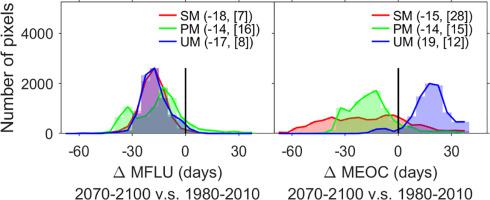Science of the Total Environment ( IF 9.8 ) Pub Date : 2020-12-03 , DOI: 10.1016/j.scitotenv.2020.143903 Hongfang Zhao , Yongshuo H. Fu , Xuhui Wang , Yuan Zhang , Yongwen Liu , Ivan A. Janssens

|
Spring phenology influences terrestrial ecosystem carbon, water and energy exchanges between the biosphere and atmosphere. Accurate prediction of spring phenology is therefore a prerequisite to foresee the impacts of climate warming on terrestrial ecosystems. In the present study, we studied the model performance of four widely used process-based models of spring leaf unfolding, including both a one-phase model (not considering a chilling phase: the Thermal Time model) and three two-phase models (all accounting for a required chilling period: the Parallel model, the Sequential model, the Unified model). Models were tested on five deciduous tree species occurring across Europe. We specifically investigated the divergence of their phenology predictions under future climate warming scenarios and studied the differences in the chilling periods. We found that, in general, the two-phase models performed slightly better than the one-phase model when fitting to the observed data, with all two-phase models performing similarly. However, leaf unfolding projections diverged substantially among the two-phase models over the period 2070-2100. Furthermore, we found that the modeled end dates of the chilling periods in these models also diverged, with advances for both the Sequential and Parallel models during the period 2070-2100 (compared to the period 1980-2010), and delays in the Unified model. These findings thus highlight large uncertainty in the two-phase phenology models and confirm that the mechanism underlying the leaf unfolding process is not yet understood. We therefore urgently need an improved understanding of the leaf unfolding process in order to improve the representation of phenology in terrestrial ecosystem models.
中文翻译:

发散模型在未来气候变暖中对温带落叶树春季物候的影响引入了很大的不确定性
春季物候影响着生物圈与大气层之间陆地生态系统的碳,水和能量交换。因此,准确预测春季物候是预测气候变暖对陆地生态系统的影响的前提。在本研究中,我们研究了四种广泛使用的基于过程的弹簧片展开模型的模型性能,包括一个阶段模型(不考虑冷却阶段:热时间模型)和三个两个阶段模型(全部考虑到所需的冷却时间:并行模型,顺序模型,统一模型)。对整个欧洲的五种落叶树种进行了模型测试。我们专门研究了在未来气候变暖情景下它们物候预测的差异,并研究了寒冷时期的差异。我们发现,总的来说,当拟合观测数据时,两相模型的性能略好于一相模型,所有两相模型的性能均相似。但是,在2070-2100年期间,两阶段模型之间的叶片展开投影大不相同。此外,我们发现这些模型中的冷却期的建模结束日期也有所不同,顺序模型和并行模型在2070-2100年期间(与1980-2010年相比)都有所进步,而统一模型中的延迟。因此,这些发现凸显了两阶段物候模型中的巨大不确定性,并证实了尚未了解叶片展开过程的机制。


























 京公网安备 11010802027423号
京公网安备 11010802027423号